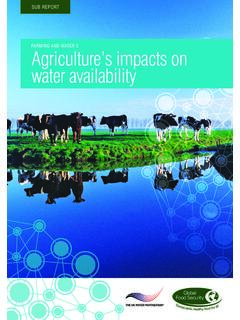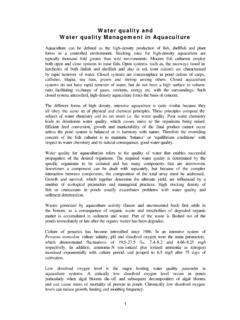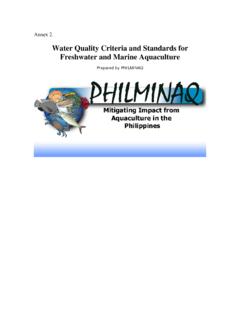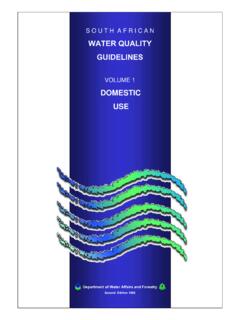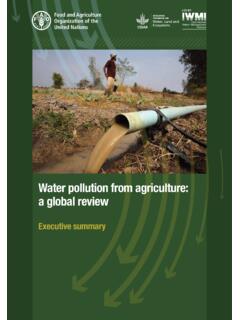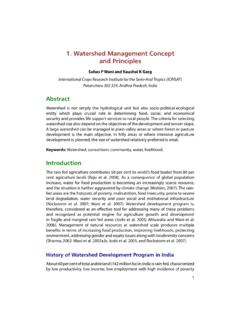Transcription of Agriculture’s impacts on water quality
1 SUB REPORT. FARMING AND water 1. agriculture 's impacts on water quality Contents Executive Summary 1. Introduction 3. The nature and scale of the problem 4. How we approach and reduce the impact of farming operations at multiple scales 7. What requires more work and new thinking? 13. Large-scale management 14. Key findings 17. References 19. Authors Joseph Holden (University of Leeds)*. Philip M. Haygarth (Lancaster University) . Jannette MacDonald (CREW, James Hutton Institute). Alan Jenkins (Centre for Ecology & Hydrology). Alison Sapiets (Syngenta Ltd). Harriet G. Orr (Environment Agency), Nicola Dunn (National Farmers Union), Bob Harris (University of Sheffield). Phillippa L. Pearson (D r Cymru Welsh water ).
2 Dan McGonigle (Defra). Ann Humble (Welsh Government). Martin Ross (South West water ). Jim Harris (Cranfield University). Theresa Meacham (Global Food Security programme). Tim Benton (Global Food Security programme) . Adam Staines (BBSRC). Andy Noble (BBSRC). * Indicates Lead Author . Indicates Working Group Co-Chair This report represents the views of the working group and not the organisations for which they work. Executive summary This report considers whether it is possible to balance high The impact of these pollutants is that currently only 24% of water aspirations for environmental water quality , with significant growth in bodies in England and 36% of water bodies in Wales meet good agricultural production to meet food security objectives and provide ecological status', as defined by the water Framework Directive viable livelihoods for farmers.
3 The quality of the UK's surface and (WFD). In Scotland, 65% of water bodies are deemed good or groundwater is affected by a multitude of factors of which land better, but for the 35% which are failing, agriculture is deemed to management is one. The report therefore considers the existing be a major pressure4. Finally, in Northern Ireland only 22% of water water quality issues associated with UK agriculture , and the routes to bodies have achieved good status5. further improvement. Challenges for managing farming's impact on water The size of the water quality problem Agricultural pollution can originate from either a point source ( In recent decades, a higher proportion of pollution has come from from a slurry store) or diffusely ( run off from larger areas of agricultural sources than the first two thirds of the twentieth century.)
4 Farmland). As diffuse pollution can arise from the contributions of This is a result of a reduction in the amount of effluent coming many smaller sources ( fields on many farms), it is often difficult from industrial sources and human settlements into watercourses, to attribute it to a specific sector or activity and the impacts of alongside an intensification of agriculture . Agricultural intensification pollution can occur some distance from the source, for example, as impacts on water quality through the release of nutrients (as a result nutrient levels increase downstream. One reason for the difficulty of soil management and fertiliser application) and other chemicals in attributing the source of pollution is that the processes by which ( pesticides) into the water environment, through biological nutrients and pollutants leave the land are complex, involving contamination ( from microbiological organisms in manure) and an interaction between locality ( slope, rainfall, soil type), via soil being eroded and washed off farmland.
5 In the UK, around management (ploughing, input regimes, field margin management 60% of nitrates and 25% of phosphorous in water bodies are etc.) and a time lag. Fully managing farming's impacts on water estimated to have farming origins1,2, and it is thought that 75% of quality requires more in-depth understanding of field- management - sediments polluting water bodies have derived from farming3. water interactions in order to inform how to adapt farming to mitigate its impacts , without impairing farm business. agriculture 's impacts on water quality | 1. Climate change may impact upon water quality by affecting the improving the accuracy of weather forecasting will also assist in volume of water flow, pathways for water movement, and the allowing farmers to apply nutrients at the right time, reducing losses associated transfer of pollutants from agricultural land to water through overland flow, leading to both economic and environmental bodies.
6 Future policies need to include requirements to manage benefits. land appropriately to reduce these impacts . Climate change may also impact upon global agricultural productivity, with a likely drive Change requires both innovation and uptake. A further challenge is towards intensification of production in the future. A challenge is to therefore to widen the uptake of new applications on the farm and find ways for growth in the farming sector, whilst reducing its impact encourage acceptability of certain practices ( finding alternative on water quality (and other environmental services). re-use points for lower grade water such as using it for non-food crops like biofuels). Demonstrator projects have been successful for Tools for incentivising better farm management this and may benefit from being more joined up in the future (see water policy in the UK operates at different scales, such as the Catchment management ' case study box).
7 Currently there is no European and national levels, the thinking and planning scale of river framework for translation of science into policy and action on the basins and catchments and the doing' scale of sub catchments, ground with regard to agriculture , the environment and water in water bodies, farms and sites. To improve communication between the UK. New measures are therefore needed to address this. A free the different scales of water policy being undertaken across the UK, advisory hub, setup for knowledge exchange to deliver a clear set being able to develop a single message for each organisation could of messages that are informed by science, policy and demonstrator help develop shared actions. projects, could be a way to increase uptake of best practice.
8 At the European level, the water Framework Directive (WFD) and The UK landscape is spatially variable and as such, regions differ Common Agricultural Policy (CAP) payments provide substantial in their capacity to contribute to production and the resulting opportunities for facilitating sustainable farm practice. However environmental costs. Smart' landscape planning to make the there is evidence that some regulation or stewardship measures best of the local context7 could help to deliver both agricultural are less effective than they could have been due to a lack of robust productivity and other ecosystem services, like water or biodiversity. implementation6 and targeting. Across the devolved administrations Long-term monitoring of water quality may help to support process and England, a number of regulatory approaches are being, or have understanding and the impact of environmental change.
9 New been, implemented to reduce pollution from rural sources. However data, managed for open access to users, alongside developments in better alignment for these policies is needed across scales and modelling capacity will provide new opportunities for understanding sectors. and mapping options and risks and the interaction between management for food and its impacts on water . What requires more work and new thinking? Despite a number of excellent examples of good farm and management practice (such as avoiding application of manures and fertiliser before predicted heavy or prolonged rainfall events, incorporating manure into the soil as soon as possible and the use of slurry injection techniques) they are still only applied over limited areas.
10 This means that there is scope for further water quality Key findings improvements. Many factors can contribute to rapid changes in A number of key findings have resulted from this report. practice, for example, fertiliser use declines as fertiliser price increases. 1. Decisions involving agriculture and water need to be made The key will be to find positive interventions that incentivise change based on a long-term perspective; with appreciation of the in increasing the efficiency of farm management . For example, time it takes for policies to have a sustained impact . 2. We need unified predictive models encompassing all key aspects of agriculture and water management that inform future policy and commercial interests.
